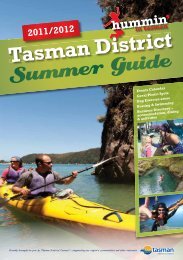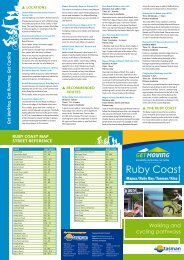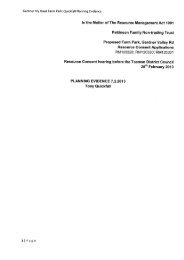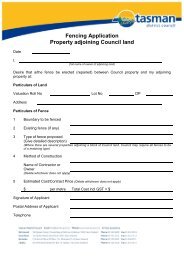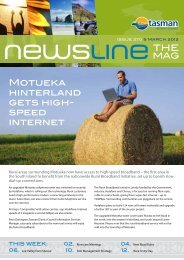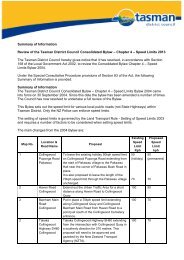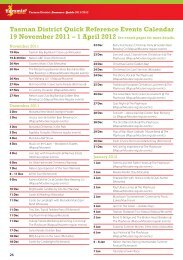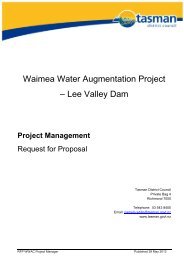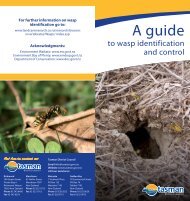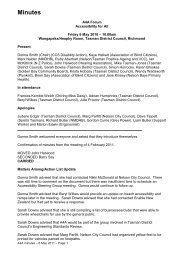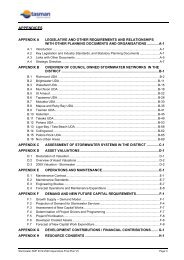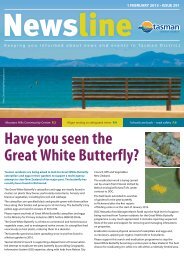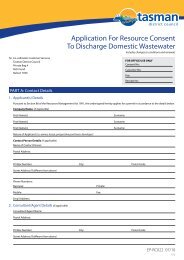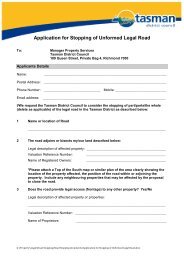Report RESC-11-03-05 NZTA Technical Audit of Local Roading ...
Report RESC-11-03-05 NZTA Technical Audit of Local Roading ...
Report RESC-11-03-05 NZTA Technical Audit of Local Roading ...
You also want an ePaper? Increase the reach of your titles
YUMPU automatically turns print PDFs into web optimized ePapers that Google loves.
Tasman District 2010 FINAL <strong>Technical</strong> <strong>Report</strong><br />
3.3 Management Systems<br />
3.3.1 Policy and Planning<br />
An Activity Management Plan (AMP) gives effect to <strong>Local</strong> and Central Government high level strategies,<br />
through detailing specific plans and programmes for management <strong>of</strong> the asset and delivery <strong>of</strong> the<br />
service. By using reliable asset information <strong>Local</strong> Authorities will be able to identify and deliver critical<br />
services to communities more effectively and efficiently.<br />
Council has made good progress with development <strong>of</strong> it’s TAMP and the latest version shows clear<br />
linkages between Community Outcomes and the adopted Levels <strong>of</strong> Service.<br />
Council understands the role <strong>of</strong> policy and strategy development and has:<br />
• developed a Maintenance Intervention Strategy;<br />
• regularly reviews its Forest Impact Strategy;<br />
• reviewed its <strong>Roading</strong> Policy Manual;<br />
• is currently reviewing its Engineering Standards; and<br />
• is considering how best to respond to irrigation and other private assets informally crossing<br />
the road corridor.<br />
The matter <strong>of</strong> sustainability <strong>of</strong> some <strong>of</strong> Council’s very low trafficked routes was recognised in<br />
discussion and is identified in the 2009 TAMP, but in Council’s view does not yet warrant development<br />
<strong>of</strong> a formal policy.<br />
Council is co-operating with <strong>NZTA</strong> and industry to develop routes suitable for High Productivity<br />
vehicles (as permitted under the Vehicle Dimensions and Mass Amendment 2010). In discussion with<br />
industry, routes have been identified. A particular risk for Tasman is the susceptibility <strong>of</strong> its pavement<br />
layers to deterioration and their extreme sensitivity to minor changes in traffic composition and<br />
moisture content.<br />
Awareness <strong>of</strong> these risks and the economic impact for the entire region drive Council in its wish to<br />
proactively manage its pavements. The challenge with this pro-active approach, particularly in the<br />
current funding regime, is to build an evidence base that is robust and able to stand the test <strong>of</strong><br />
scrutiny. To effectively support a proposal that may otherwise seem premature, Council will need to<br />
collect experience and evidence <strong>of</strong> behaviour beyond the proposed sites and from across the network.<br />
The <strong>NZTA</strong> expects that all approved organisations will have an endorsed procurement strategy and be<br />
using the Procurement Manual by 1 October 2010. From this date, the Competitive Pricing Procedures<br />
will be withdrawn and will no longer be valid for procuring activities funded through the NLTP. It is<br />
considered best practice that procurement strategies cover at least a three-year NLTP work<br />
programme. Tasman DC had commenced development <strong>of</strong> its Procurement Strategy and the document<br />
has since been endorsed by <strong>NZTA</strong> and approved by Council.<br />
Development <strong>of</strong> Council’s procurement strategy will create another opportunity to look at how Council<br />
manages the asset. Its preparation will demonstrate that Council knows and understands the needs <strong>of</strong><br />
the network and its services and has given consideration to how this can and should be delivered.<br />
6



